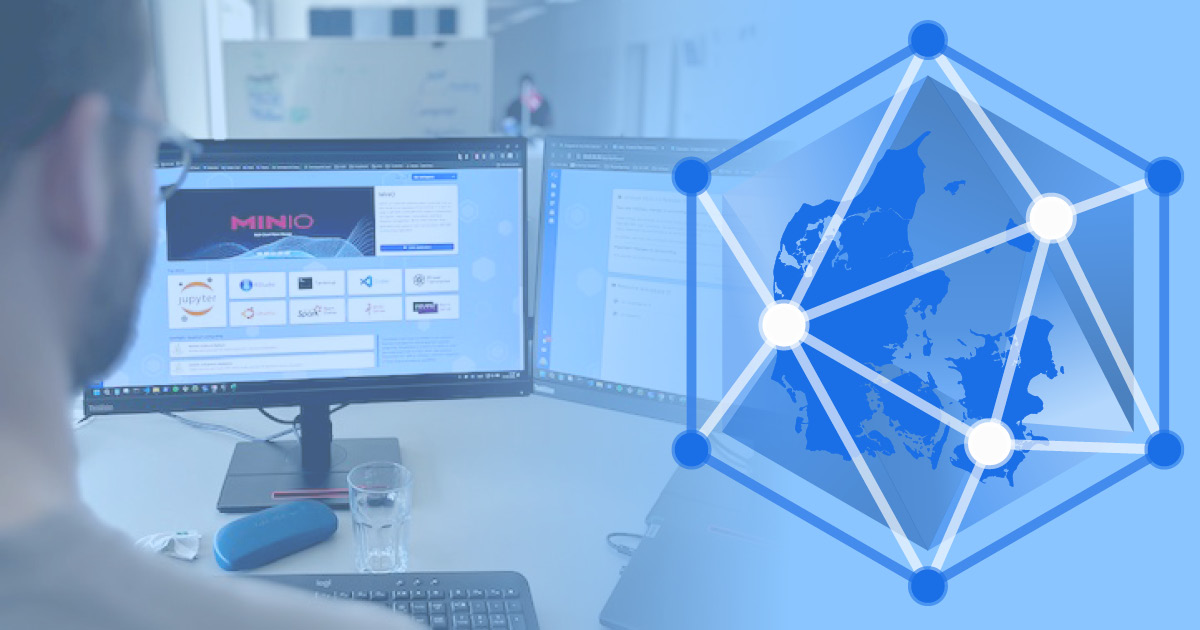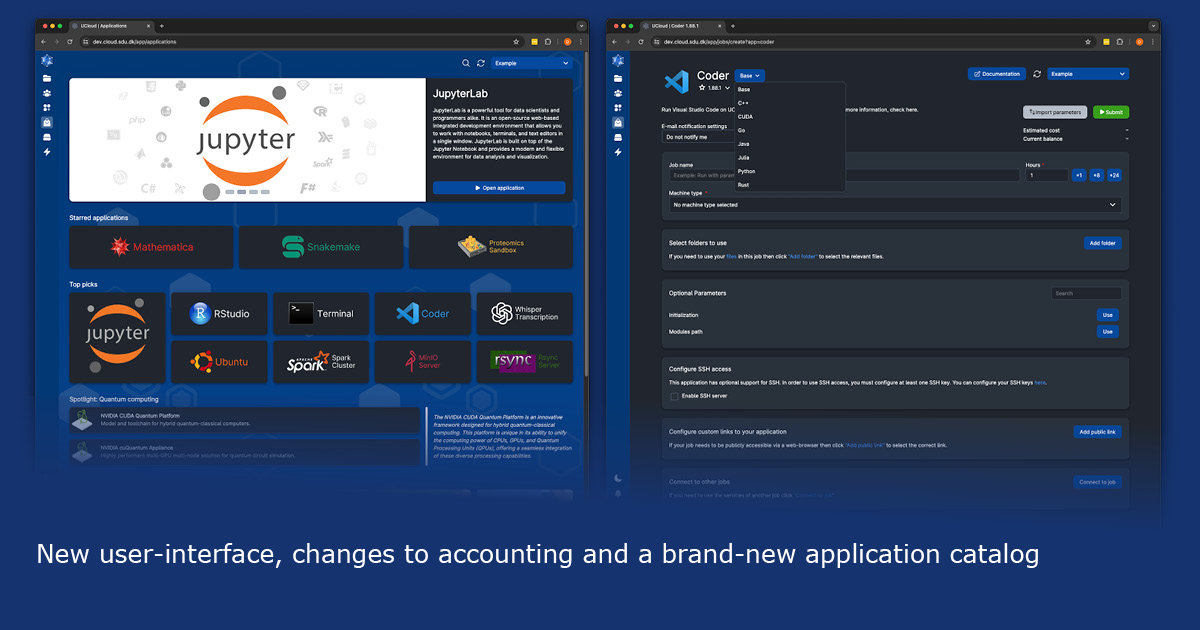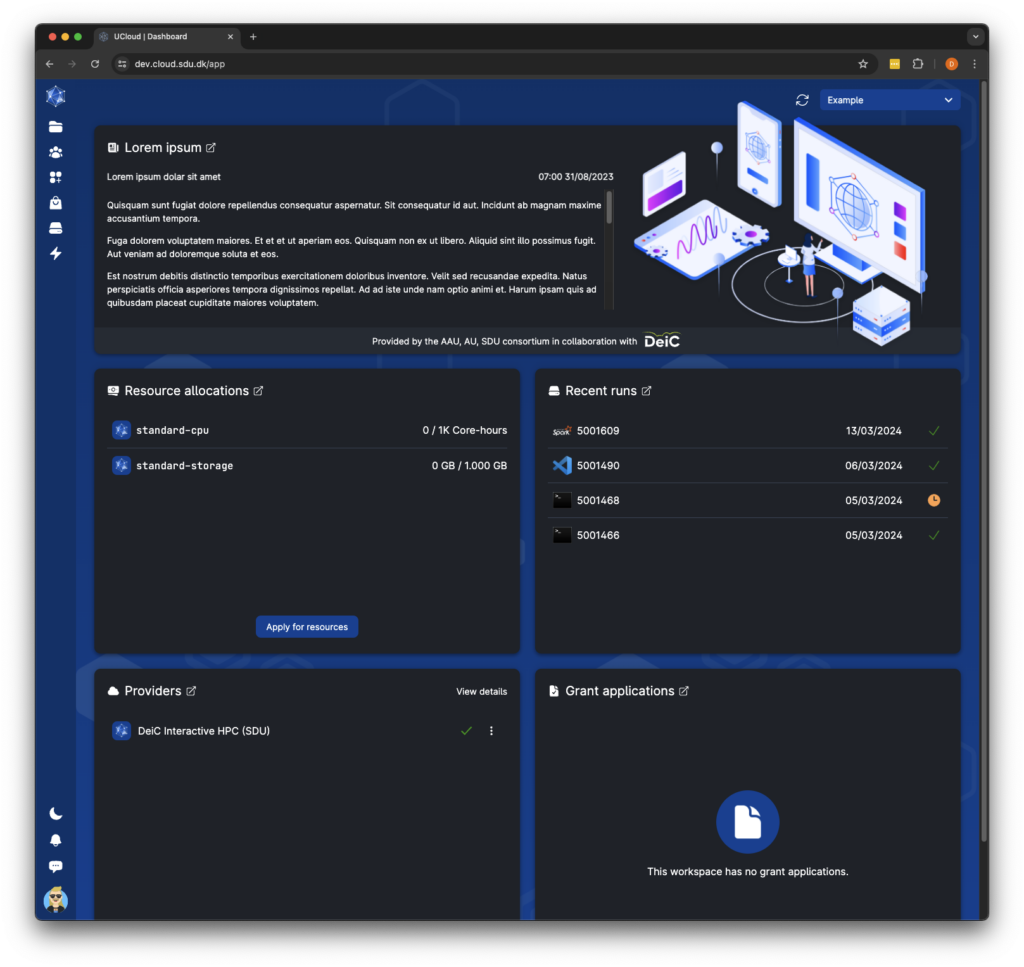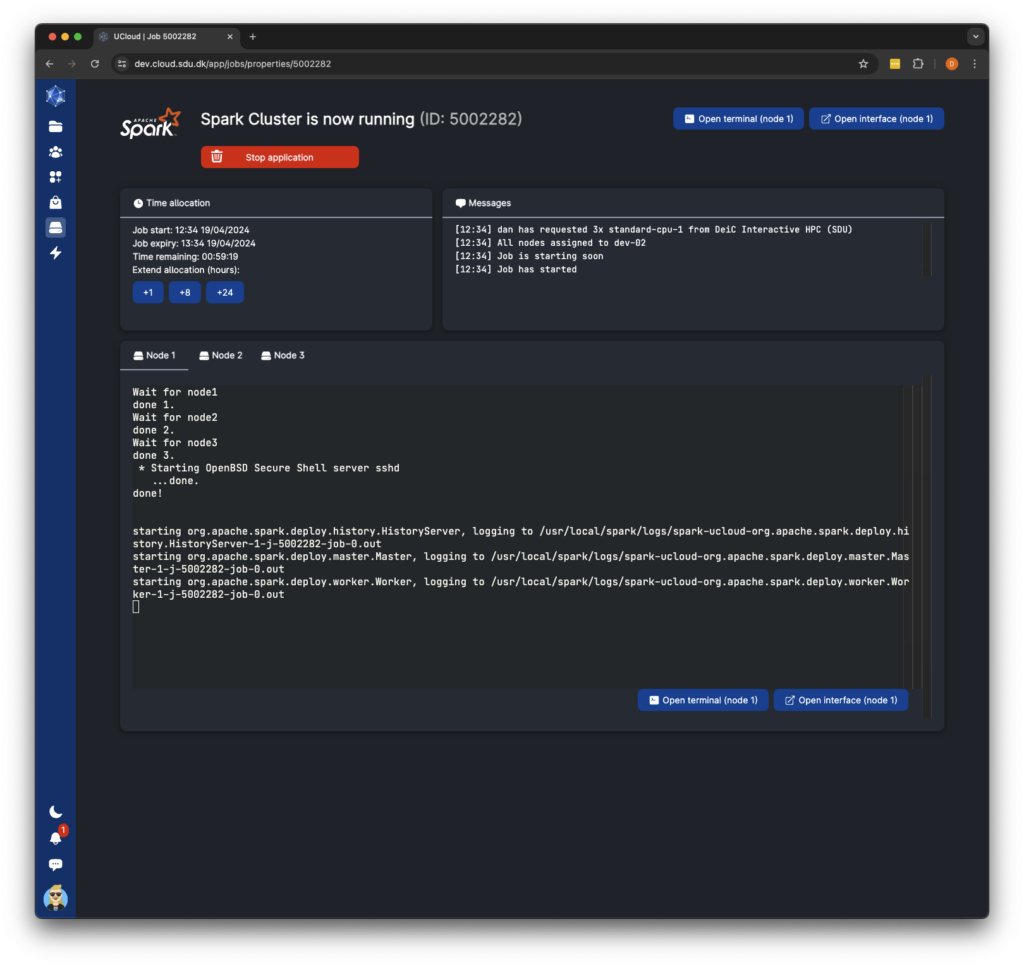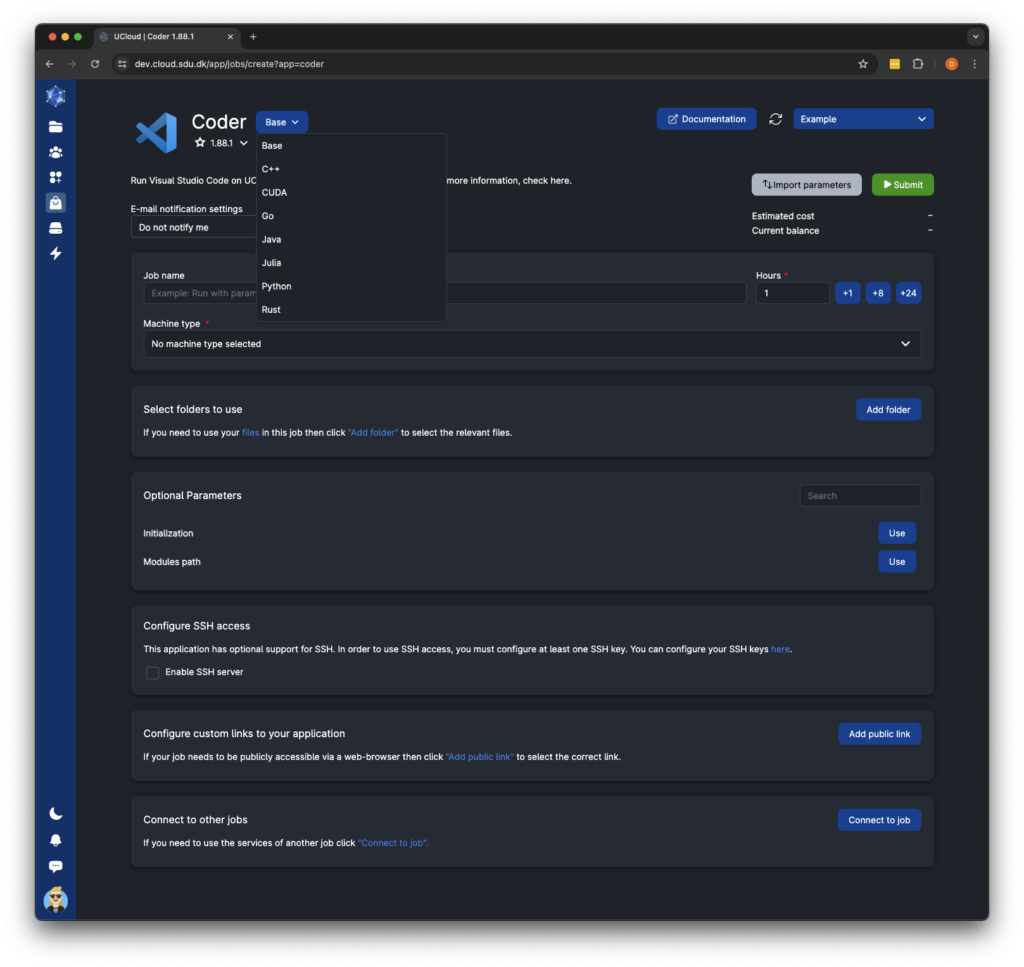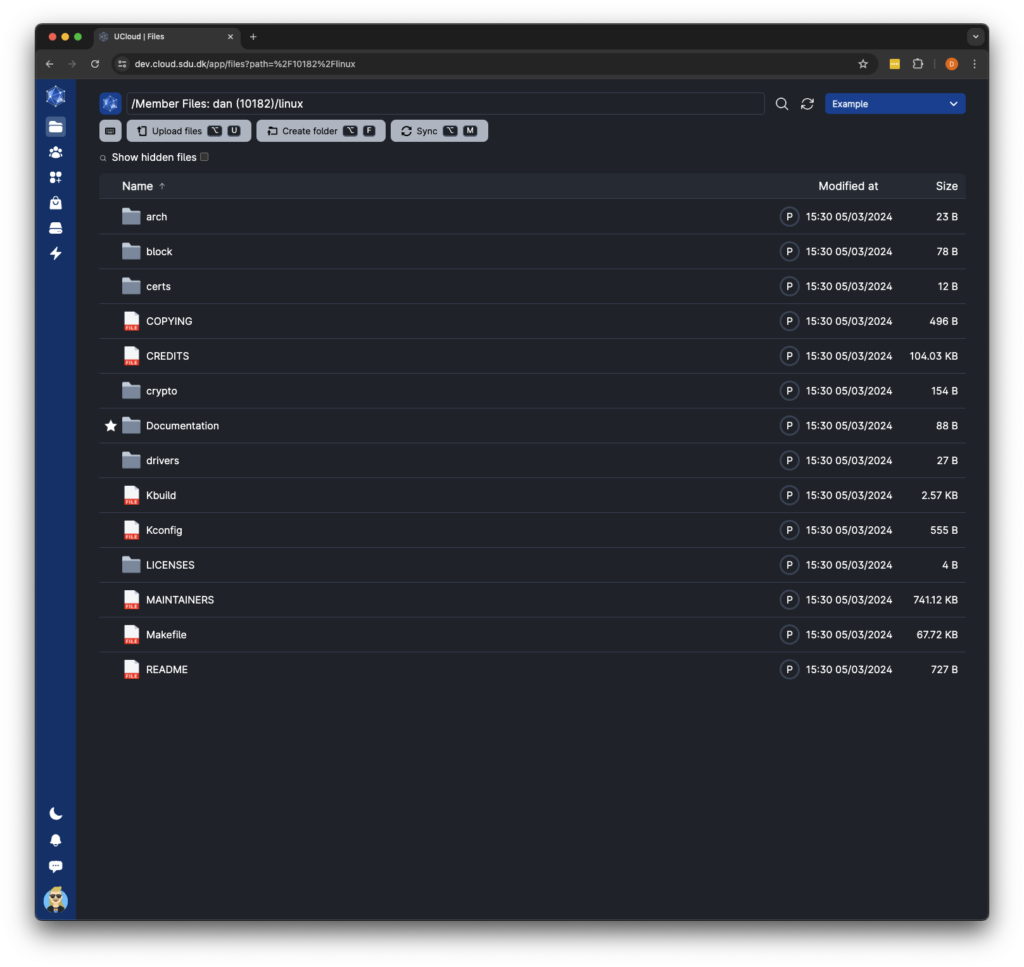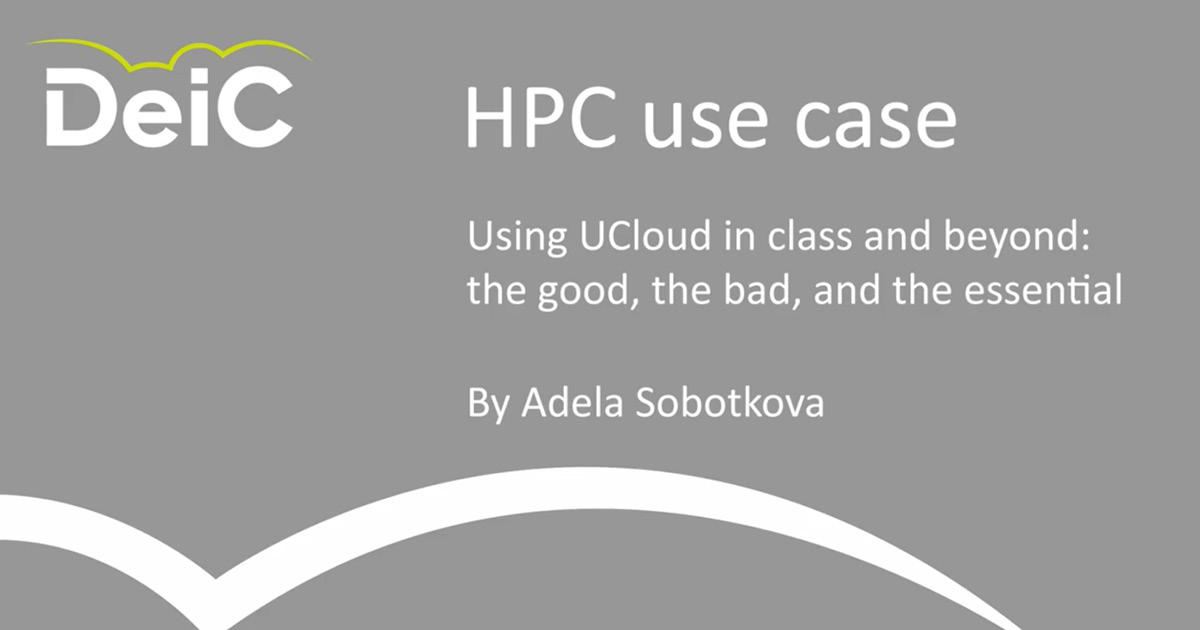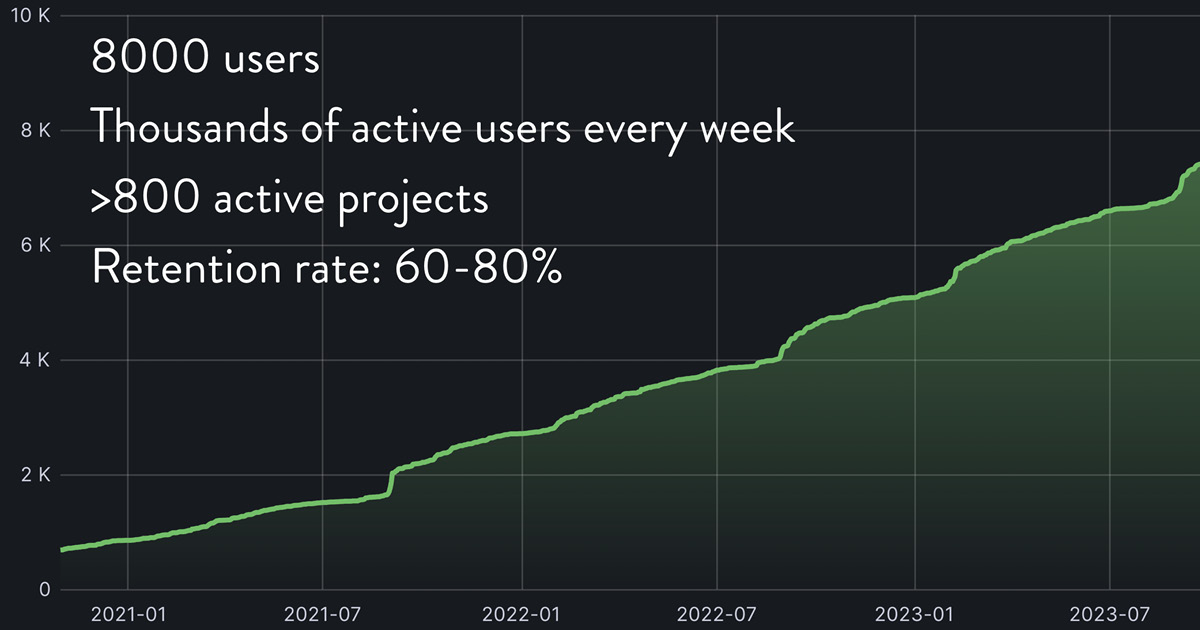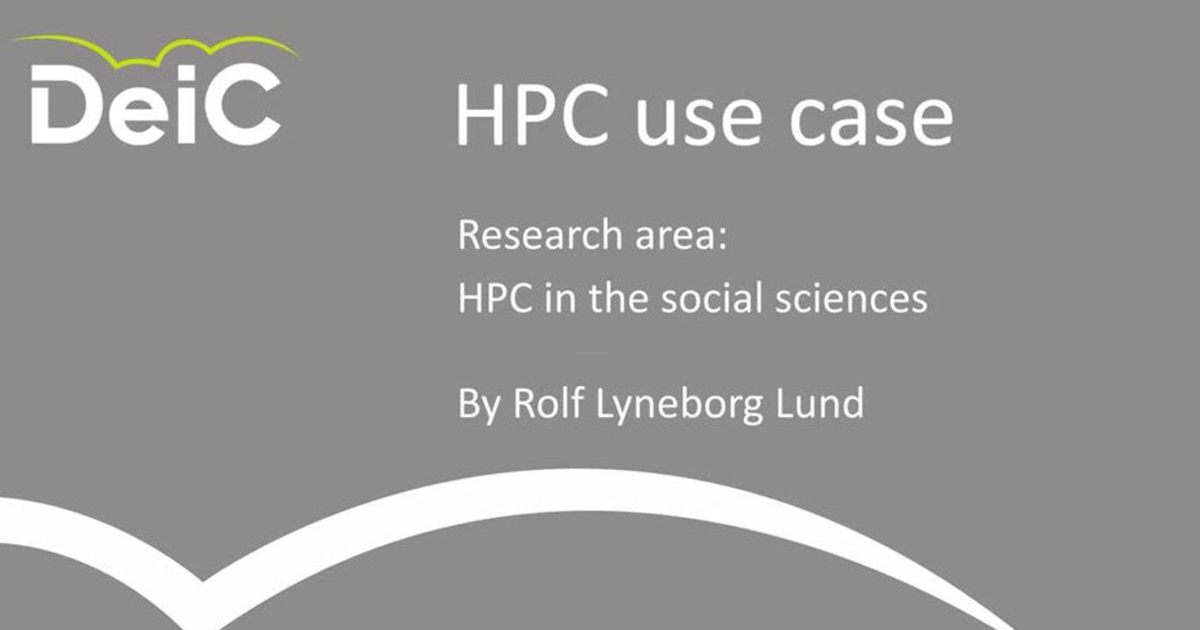With 10,000 users, DeiC Interactive HPC has established itself as one of Europe’s most popular HPC facilities, thanks to an unprecedented democratisation of access to advanced computing resources. These resources, once reserved for specialised research fields and technically adept specialists, are now accessible to any researcher with a dataset and a vision.
Through a newly developed, simple, and graphical user interface, DeiC Interactive HPC, also known as UCloud, makes it easier than ever to gain interactive access to supercomputing. This approach reduces technical barriers and enhances research collaboration by offering shared, easily accessible virtual environments. As a result, DeiC Interactive HPC supports dynamic and interdisciplinary research, accelerating research processes and promoting innovation in fields ranging from bioinformatics to digital humanities.
Democratising Access to HPC
The trend towards more interactive use of technology, including HPC, reflects efforts to make the STEM field more inclusive and accessible, mirroring broader societal changes towards diversity and inclusion in technology and science. DeiC Interactive HPC’s user-friendly approach has attracted a broad spectrum of users, including those from nearly all Danish universities and individuals with varying levels of technical expertise, notably many students.
“We are proud to highlight the growing diversity among DeiC Interactive HPC users, a development that further distinguishes DeiC Interactive HPC from traditional HPC systems. We see continuous growth in user numbers and are now celebrating surpassing 10,000 users across a very broad spectrum of research disciplines, which is impressive in the HPC field. Of these users, 50% are students, reflecting DeiC Interactive HPC’s success in attracting new users and serving as a bridge to larger European HPC facilities,” says Professor Kristoffer Nielbo, representing Aarhus University in the DeiC Interactive HPC Consortium.
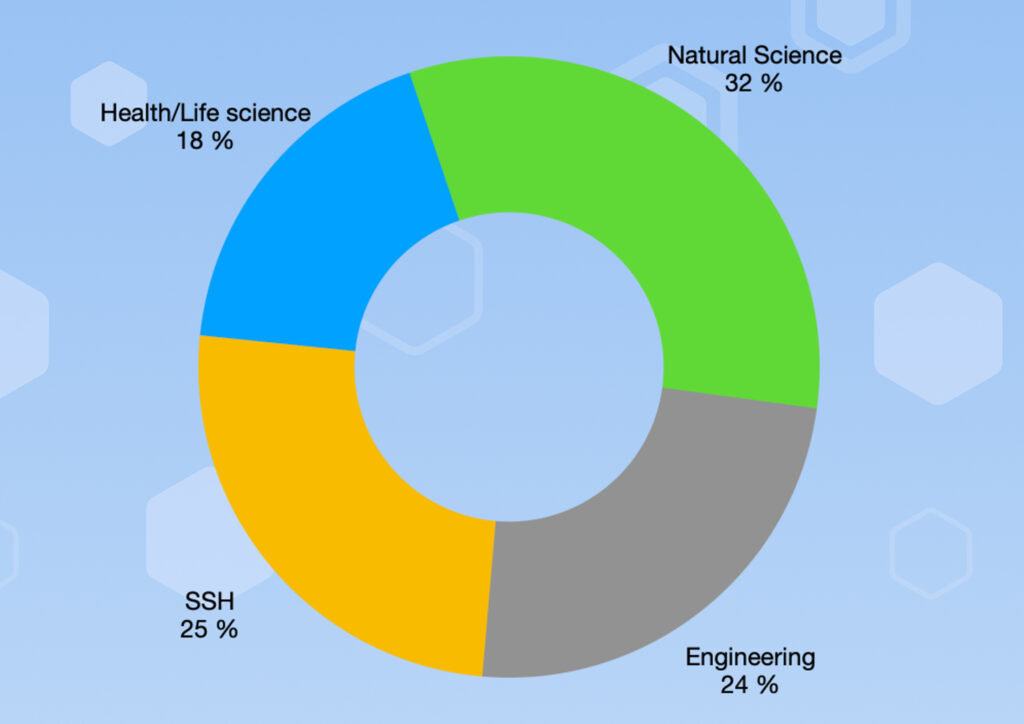
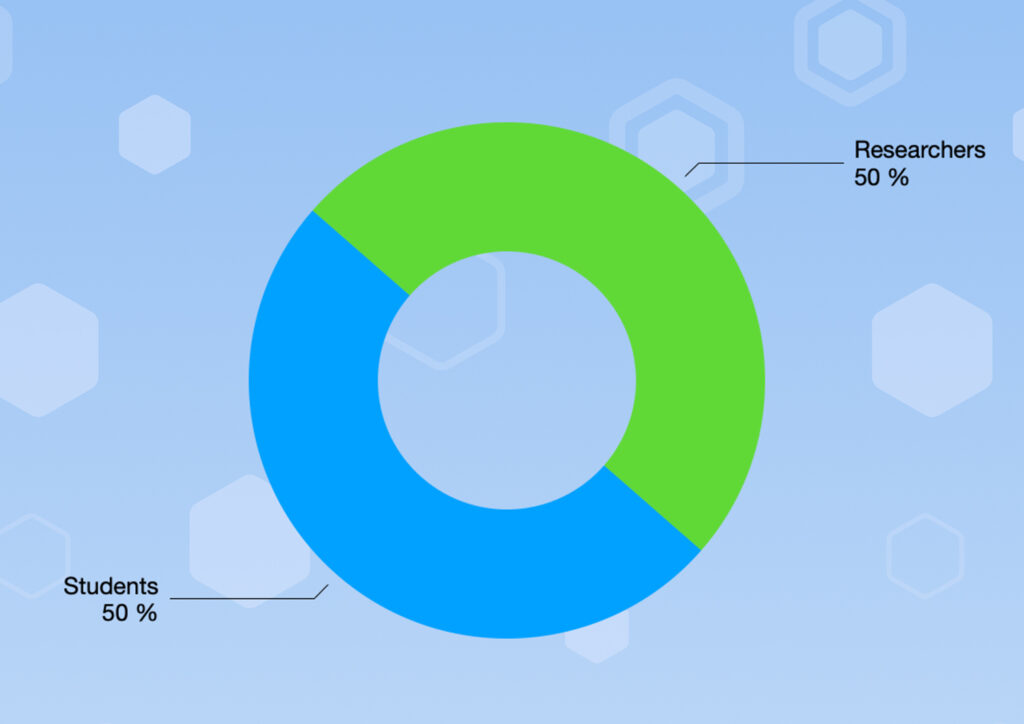
By simplifying access to supercomputers, DeiC Interactive HPC democratises powerful data processing resources, enabling a wider range of researchers and academics to conduct innovative research without the steep learning curve traditionally associated with HPC. This inclusivity fosters scientific collaboration and creativity, enriching the HPC community with a diversity of perspectives and ideas.
“We continuously work to improve DeiC Interactive HPC with a democratic approach, using user feedback to ensure our focus is in the right place. This is also reflected in our new update – UCloud version 2 – which aims to increase efficiency and improve the user experience for researchers. It is part of our DNA as an interactive HPC facility to always keep the user in mind and develop apps and user interfaces based on user needs. Therefore, we encourage our users to reach out to us with their wishes and ideas,” says Professor Claudio Pica, representing the University of Southern Denmark in the DeiC Interactive HPC Consortium.
Did You Know
– that DeiC Interactive HPC provides resources for developing large AI language models through initiatives such as Danish Foundation Models (DFM) and the new Danish Language Model Consortium?
– that nearly 80 apps are available via UCloud’s App Store, including the Chat-GPT-like app, Chat-UI, and transcription tools Transcriber and Whisper Transcription?
– that 25% of users on Interactive HPC come from the Social Sciences & Humanities, a unique figure as HPC traditionally caters almost exclusively to Natural Science, Health/Life Science, and Engineering?
An All Danish and Highly Secure System
Despite its internationally sounding name, UCloud, DeiC Interactive HPC is part of the Danish HPC landscape, funded by Danish universities and the Ministry of Education and Research. The increased focus on developing a new generation of highly user-friendly applications means that researchers and other university staff can now use intuitive applications for transcribing sensitive data via DeiC Interactive HPC.
“DeiC Interactive HPC has already developed applications based on the same transcription technology found online and made them available in a secure environment through the UCloud platform. These transcription applications are just the beginning of a series of targeted secure applications that do not require prior experience, and we are always open to user input and ideas that arise from their unique needs but often prove beneficial to many,” says Lars Sørensen, Head of Digitalisation, representing Aalborg University and CLAAUDIA in the DeiC Interactive HPC Consortium.
By making advanced data processing more accessible to researchers from various disciplines, DeiC Interactive HPC helps break down the technical barriers that previously limited access to these resources. With an increasing number of students and new users from diverse backgrounds combined with continuous engagement in user-centred innovation, DeiC Interactive HPC not only supports the academic community but also plays a crucial role in promoting a more inclusive and productive research environment.
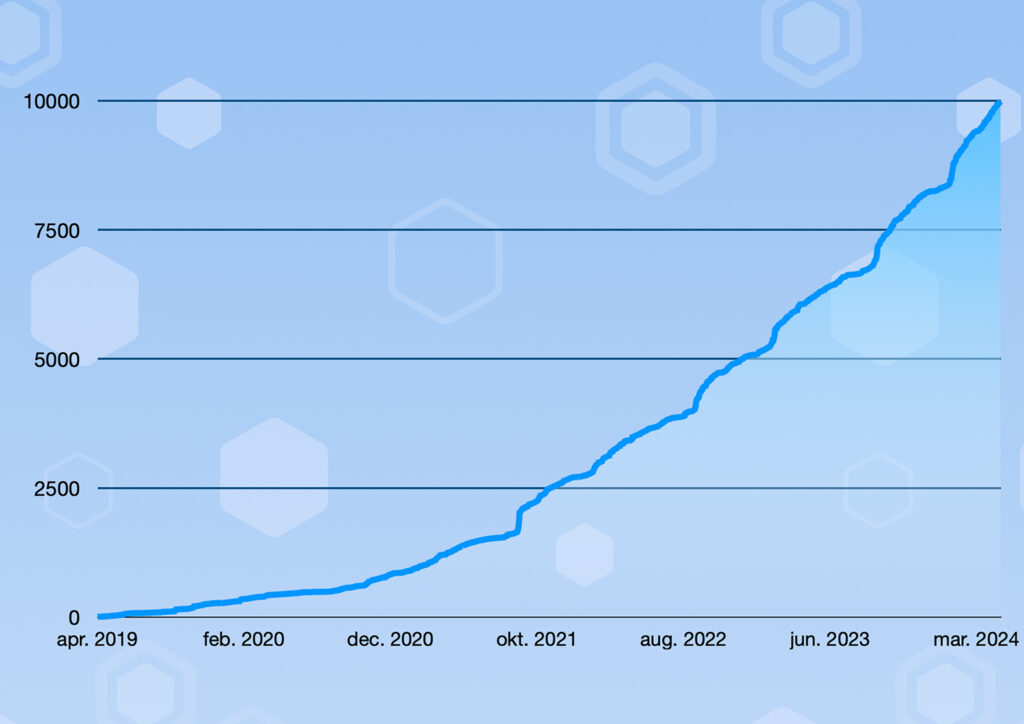
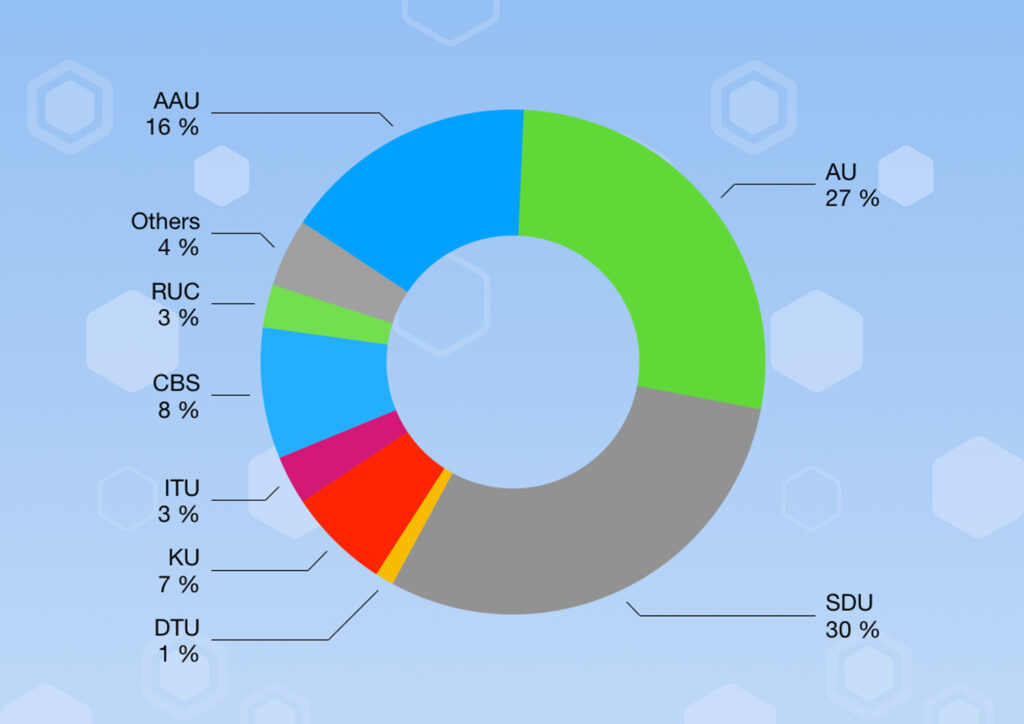
For further information and high resolution graphics, contact:
Kristoffer Nielbo, Director of Center for Humanities Computing, Aarhus University, 26832608 kln@cas.au.dk
About DeiC Interactive HPC (UCloud)
UCloud offers access to advanced tools such as quantum simulation apps and H100 GPUs as well as applications aimed at data analysis and visualisation.
In data analysis, Python and Jupyter notebooks are particularly prominent, catering to the interactive, ad hoc, and data-centric workflows common in the field. These tools are highly valued for their user-friendliness in handling rapidly changing software environments and offer rich user interfaces, a significant advantage compared to traditional HPC setups, which can be more complex or less flexible.
Furthermore, the integration of tools such as Conda for managing software packages, Jupyter notebooks, Rstudio, Coder, and Dask for parallel computing significantly enhances the usability of HPC resources for interactive and on-demand data processing needs. These tools help bridge the gap between the hardware of complex HPC systems and the user-friendly software environments that data scientists require.
Links
About the Consortium
DeiC Interactive HPC (UCloud) is a successful collaboration between three universities: SDU, AU, and AAU.
Aalborg University, CLAAUDIA, represented by Lars Sørensen
SDU, eScience Center, represented by Professor Claudio Pica
Aarhus University, Center for Humanities Computing, represented by Professor Kristoffer Nielbo
Danish Version
DeiC Interactive HPC revolutionerer tværfaglig forskning med brugervenlig adgang til supercomputing
Med 10.000 brugere har DeiC Interactive HPC cementeret sin position som en af Europas mest populære HPC-faciliteter, takket være en hidtil uset demokratisering af adgangen til avancerede computerressourcer. Disse ressourcer, som tidligere var forbeholdt specialiserede forskningsområder og teknisk kyndige specialister, er nu tilgængelige for enhver forsker med et dataset og en vision.
Gennem en nyudviklet, enkel og grafisk brugergrænseflade gør DeiC Interactive HPC, også kendt som UCloud, det nemmere end nogensinde før at få interaktiv adgang til supercomputing. Denne tilgang reducerer de tekniske barrierer og forbedrer samtidig mulighederne for forskningssamarbejde ved at tilbyde delte, lettilgængelige virtuelle miljøer. Således understøtter DeiC Interactive HPC dynamisk og tværfaglig forskning, som accelererer forskningsprocesser og fremmer innovation inden for alt fra bioinformatik til digital humaniora.
Demokratisering af adgang til HPC
Tendensen til mere interaktiv brug af teknologi, herunder HPC, afspejler bestræbelser på at gøre STEM-området mere inkluderende og tilgængeligt, hvilket igen afspejler en bredere samfundsmæssig forandring og udvikling i retning af diversitet og inklusion i teknologi og videnskab. DeiC Interactive HPC’s brugervenlige tilgang har tiltrukket et bredt spektrum af brugere, herunder brugere fra stort set alle Danmarks universiteter samt personer med forskellige niveauer af teknisk ekspertise – ikke mindst mange studerende.
“Vi er stolte over at fremhæve den voksende diversitet blandt brugerne af DeiC Interactive HPC, en udvikling der yderligere adskiller DeiC Interactive HPC fra de traditionelle HPC-systemer. Vi ser en kontinuerlig vækst i andelen af brugere og kan netop nu fejre, at vi har rundet 10.000 brugere fordelt på et meget bredt spektrum af forskningsdiscipliner, hvilket er imponerende i HPC-regi. Af disse brugere er 50% studerende, hvilket vidner om DeiC Interactive HPC’s succes med at tiltrække nye brugere og fungere som en brobygger til de større europæiske HPC-faciliteter,” udtaler professor Kristoffer Nielbo, der repræsenterer Aarhus Universitet i DeiC Interactive HPC-Konsortiet.


Ved at forenkle brugernes adgang til supercomputere demokratiserer DeiC Interactive HPC adgangen til kraftfulde databehandlingsressourcer, hvilket gør det muligt for et større udvalg af forskere og akademikere at skabe innovativ forskning uden den stejle læringskurve, der traditionelt er forbundet med HPC. Denne inklusivitet fremmer ikke kun videnskabeligt samarbejde og kreativitet, men beriger også HPC-fællesskabet med en mangfoldighed af perspektiver og ideer.
“Vi arbejder kontinuerligt på at forbedre DeiC Interactive HPC, og vi gør det med en demokratisk tilgang, hvor vi anvender brugerfeedback til at sikre, at vores fokus er rette sted. Det afspejler sig også i vores nye opdatering – UCloud version 2- der har til formål at øge effektiviteten og forbedre brugeroplevelsen for forskerne. Det er en del af vores DNA som interaktiv HPC-facilitet, at vi hele tiden har brugeren for øje og udvikler apps og brugergrænseflade efter brugernes behov. Derfor opfordrer vi også vores brugere til at række ud til os med deres ønsker og ideer,” udtaler professor Claudio Pica, der repræsenterer Syddansk Universitet i DeiC Interactive HPC-Konsortiet.
Vidste du
– at DeiC Interactive HPC leverer ressourcer til udvikling af store AI sprogmodeller i form af initiativer som Danish Foundation Models (DFM) og det helt nye Dansk Sprogmodel Konsortium?
– at man via UCloud’s App Store kan finde næsten 80 apps, inklusiv den Chat-GPT-lignende app, Chat-UI, og transskriptionsværktøjerne Transcriber og Whisper Transcription?
– at hele 25% af brugerne på Interactive HPC stammer fra områderne Social Sciences & Humanities, hvilket er helt unikt, da HPC traditionelt henvender sig stort set udelukkende til Natural Science, Health/Life Science og Engineering?
Pæredansk og topsikret system
Til trods for sit internationalt klingende navn, UCloud, er DeiC Interactive HPC en del af det danske HPC-landskab, som er finansieret af de danske universiteter og Uddannelses- og Forskningsministeriet, og et øget fokus på udvikling af en ny generation af særdeles brugervenlige applikationer, betyder at forskere og andet universitetspersonale allerede nu kan bruge intuitive applikationer til transskription af følsomme data via DeiC Interactive HPC.
“DeiC Interactive HPC har allerede udviklet applikationer baseret på den samme transskriptionsteknologi, som man finder online, og gjort dem tilgængelige i et sikret miljø gennem UCloud-platformen. Disse transskriptionsapplikationer er blot begyndelsen på en serie af målrettede sikre applikationer, der ikke kræver forudgående erfaring, og vi er som altid åbne for brugernes input og ideer, som opstår af deres unikke behov, men som ofte viser sig, at være til gavn for mange,” udtaler digitaliseringschef Lars Sørensen, der repræsenterer Aalborg Universitet og CLAAUDIA i DeiC Interactive HPC-konsortiet.
Ved at gøre avanceret databehandling mere tilgængelig for forskere fra forskellige discipliner, hjælper DeiC Interactive HPC med at nedbryde de tekniske barrierer, der tidligere har begrænset adgangen til disse ressourcer. Med en stigende andel af studerende og nye brugere fra varierede baggrunde kombineret med kontinuerligt engagement i brugercentreret innovation, understøtter DeiC Interactive HPC ikke blot det akademiske samfund men spiller også en vigtig rolle i at fremme et mere inklusivt og produktivt forskningsmiljø.


For yderligere information og grafikker i høj opløsning, kontakt:
Kristoffer Nielbo, Center for Humanities Computing, Aarhus University, 26832608 kln@cas.au.dk
Om DeiC Interactive HPC (UCloud)
UCloud tilbyder adgang til både avancerede værktøjer som kvantesimuleringsapps og H100 GPU’er såvel som applikationer rettet mod dataanalyse og visualisering.
Inden for dataanalyse er Python og Jupyter-notebooks især fremtrædende, da de imødekommer de interaktive, ad hoc og datacentriske arbejdsprocesser, der er almindelige i feltet. Disse værktøjer er højt værdsat for deres brugervenlighed i håndtering af hurtigt skiftende softwaremiljøer og tilbyder rige brugergrænseflader, hvilket er en betydelig fordel sammenlignet med traditionelle HPC-opsætninger, som kan være mere komplekse eller mindre fleksible.
Derudover forbedrer integrationen af værktøjer som Conda til styring af softwarepakker, Jupyter-notebooks, Rstudio, Coder og Dask til parallel computing væsentligt brugbarheden af HPC-ressourcer til interaktive og on-demand databehandlingsbehov. Disse værktøjer hjælper med at overbygge kløften mellem komplekse HPC-systemers hardware og de brugervenlige softwaremiljøer, som dataforskere har brug for.
Links
Om konsortiet
DeiC Interactive HPC (UCloud) er et vellykket samarbejde mellem tre universiteter: SDU, AU og AAU.
Aalborg Universitet, CLAAUDIA, repræsenteret af Lars Sørensen
SDU, eScience Center, repræsenteret af professor Claudio Pica
Aarhus Universitet, Center for Humanities Computing, repræsenteret af professor Kristoffer Nielbo

